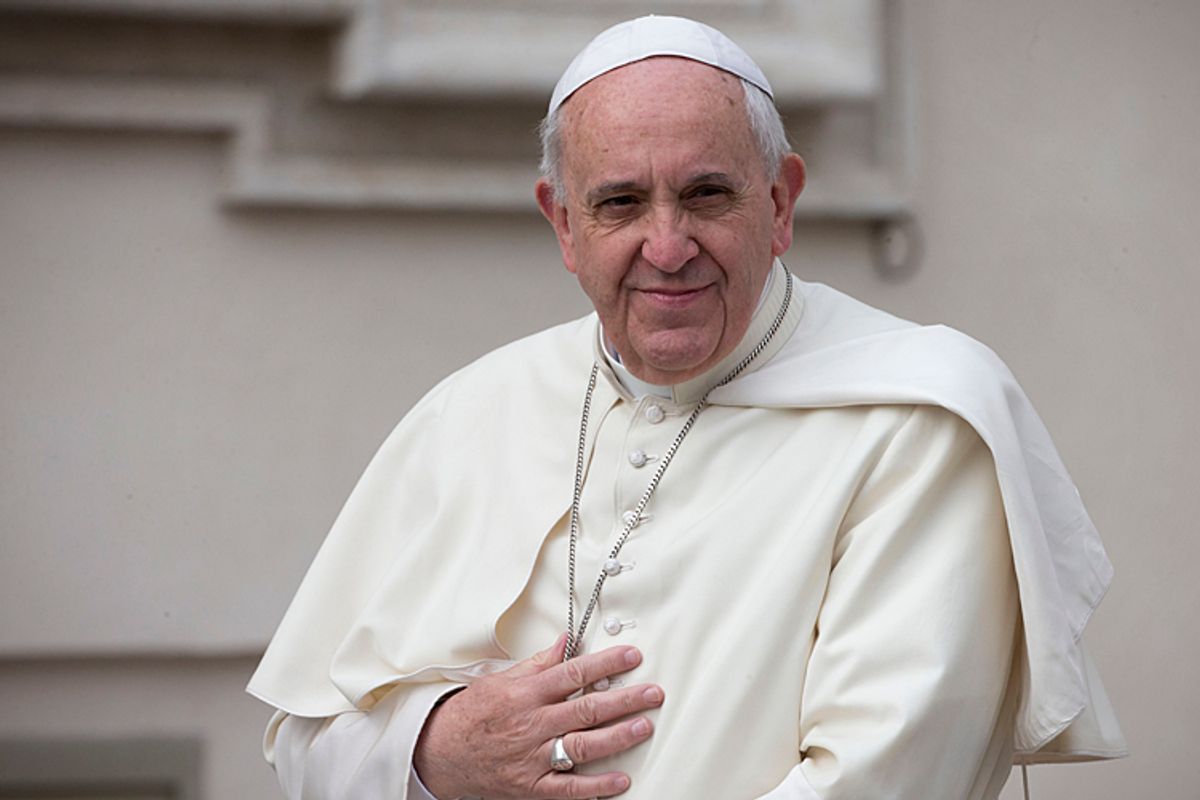 The 2013 election of Pope Francis marked a number of firsts for the Catholic Church: the first Jesuit pope, the first from the Americas, the first to have worked as a nightclub bouncer, and the first non-European to lead the church in 1200 years.
The 2013 election of Pope Francis marked a number of firsts for the Catholic Church: the first Jesuit pope, the first from the Americas, the first to have worked as a nightclub bouncer, and the first non-European to lead the church in 1200 years.
He’s also the first pontiff to heartily recommend Lord of the World, Robert Hugh Benson’s trippy dystopian novel from 1907—a strange, intense and not entirely successful book about the rise of the anti-Christ, the demise of the Church and the end of the world.
Perhaps Pope Francis’s enthusiasm shouldn’t be so surprising. Benson, a Catholic priest, was a popular writer in his time, and his dark vision of a world destroyed by secular humanism still resonates with a small but loyal following. In a 2013 homily, Pope Francis spoke of Lord of the World “almost as though it were a prophecy.”
And what did Benson prophesy? A catalogue of early 20th century right-wing fears. In Lord of the World, religion has been subsumed to a kind of hyper-rational communism, the professions have been nationalized, and euthanasia and suicide are legal. Worst of all, Esperanto is the official language of Britain.
Julian Felsenburgh, a man of great charisma and linguistic ability, then rises from U.S. senator (from Vermont, no less) to President of the World. He encourages pogroms against Catholics and destroys Rome, which everybody goes along with, even though the guy might as well have a giant blinking Anti-Christ on his forehead.
The President of the World tracks down the last Pope and his retinue, who have taken refuge in Nazareth, and bombs them too. And that’s the end of everything. “Then this world passed, and the glory of it,” writes Benson.
With his flying boats and underground cities, Benson does create a fun kind of steampunk future, avant le lettre. But the novel’s infelicities are numerous. Benson is overfond of turgid passages wherein some character sits around thinking and praying, or praying and thinking, or merely thinking. Not to mention his fatuous conflation of Marxism, Freemasonry and Judaism. (Felsenburgh? Really?)
Benson was part of the great tradition of intellectual Britons who converted to Catholicism—the tradition that gave us John Henry Newman, Gerard Manley Hopkins, G.K. Chesterton, Evelyn Waugh and Graham Greene. If only the quality of Benson’s writing were in the same vein. After reading this book it’s difficult to understand why he was famous in his day.
That is, until one considers the extraordinary success of the Left Behind series. You may recall that these novels (and videos and YA series and films) are a dramatization of the evangelical version of the apocalypse—that is, the Rapture, when all the true believers are snatched up to heaven and the rest of us are left here to battle it out. Left Behind is smug, violent, sexist, racist and anti-Semitic. Reading it, one sometimes imagines a drooling white supremacist scribbling in crayon. Nevertheless this triumphalist version of the End Times has great appeal for millions of Americans, perhaps because it panders to their own prejudices, egos and sense of rightness.
Lord of the World could be considered a kind of inversion of Left Behind. The triumphalist fantasy of Benson’s apocalypse is milder, but it’s there: all Abrahamic competitors—Protestants, Muslims and Jews—succumb to Felsenburgh’s great charms, leaving Catholics to stand alone against secularism. In Lord of the World, Catholics, in fact, are like Jews, oppressed by sumptuary laws and pogroms, eventually forced to practice in secret and finally suffering annihilation.
This romantic vision may explain the novel’s appeal to early 20th century Catholics. But the question is what Pope Francis sees in it. Some commentators wonder whether he harbors apocalyptic yearnings, though it’s more likely that Benson has articulated some of the pope’s own ideological concerns. In that 2013 homily, Pope Francis explained how Lord of the World illustrated the dangers of “adolescent progressivism”—the idea that at any crossroads it’s always better to abandon the traditions of the past.
In a more recent press conference, Pope Francis mentioned Lord of the World in the context of “ideological colonization,” which he described as a foreign entity introducing people to “an idea that has nothing, nothing to do with the nation.” He gave the example of a poor country that couldn’t get loans to build schools unless the students were taught gender theory.
While it is ironic, to say the least, for the leader of the Catholic Church to fret about ideological colonization, I wouldn’t dismiss the pope’s comments entirely. The twentieth century was indeed a time of ideological colonization, when communism was shoved down peoples’ throats. It’s not an exaggeration to say that countless millions died in the supposed name of progress, and in many places (i.e. Poland) the Catholic Church was a real source of fellowship and comfort.
But this is intellectual stuff. My guess is that the novel, with its gentle, steadfast, long-suffering, humane Catholics, exerts a strong emotional appeal for Pope Francis as well. In Left Behindtriumphalism manifests in gleeful mass murder. In Lord of the World it manifests in martyrdom.



Shares